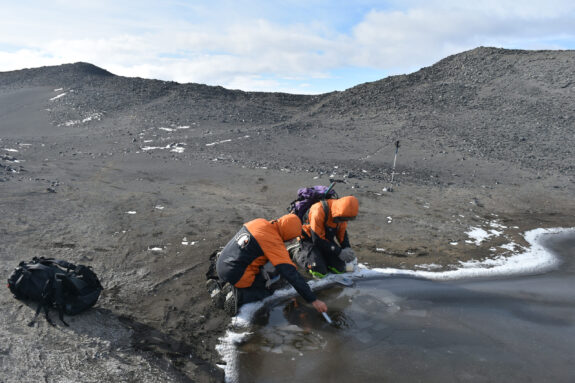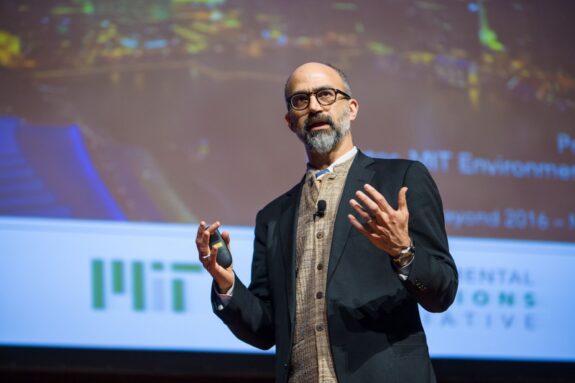Spencer Compton, Karna Morey, Tara Venkatadri, and Lily Zhang named 2021-22 Goldwater Scholars

Four MIT undergraduates whose research areas explore artificial intelligence, space, and climate change honored for their academic achievements.
Read this at MIT News
MIT students Spencer Compton, Karna Morey, Tara Venkatadri, and Lily Zhang have been selected to receive a Barry Goldwater Scholarship for the 2021-22 academic year. Over 5,000 college students from across the United States were nominated for the scholarships, from which only 410 recipients were selected based on academic merit.
The Goldwater scholarships have been conferred since 1989 by the Barry Goldwater Scholarship and Excellence in Education Foundation. These scholarships have supported undergraduates who go on to become leading scientists, engineers, and mathematicians in their respective fields. All of the 2021-22 Goldwater Scholars intend to obtain a doctorate in their area of research, including the four MIT recipients.
Spencer Compton
A junior majoring in computer science and engineering, Compton is set to graduate next year with both his undergraduate and master’s degrees. For Compton, solving advanced problems is as fun as it is challenging — he’s been involved in algorithm competitions since high school, where, on the U.S. team for the 2018 International Olympiad in Informatics, Compton won gold. “I still participate — there’s a college equivalent, the Intercollegiate Programming Contest or ICPC, and I’m on last year’s MIT team that won first in North America,” reports Compton. “We were supposed to represent MIT in the World Finals in Russia last summer, but it’s been postponed due to Covid.” Compton brings his competitive and enthusiastic mindset to his areas of research, including his collaboration on causal inference with the MIT-IBM Watson AI Lab, and his work on approximation algorithms and scheduling with professor of electrical engineering and computer science Ronitt Rubinfeld and postdoc Slobodan Mitrović.
In her recommendation letter, Rubinfeld, a member of the Computer Science and Artificial Intelligence Laboratory, spoke at length about Compton’s aptitude as a student but she also left a glowing review as to Compton’s character. “Spencer is extraordinarily pleasant to work with. He is kind and caring when he interacts with younger students. I once had a high school student follow me for a day on which I happened to have a meeting with Spencer — she was so impressed with him that he became a role model for her,” wrote Rubinfeld. Following the completion of his current degrees at MIT, Compton plans to obtain his PhD in computer science, continue his research in algorithms, and teach at the university level.
Karna Morey
Morey is a third-year majoring in physics with a minor in Spanish. He got interested in physics while reading Albert Einstein’s biography in the seventh grade, and performed research for two years in high school on gravitational wave physics of a body falling into a black hole. On campus, he has been involved in physics research in theoretical and observational astrophysics, as well as in condensed matter experiments. He recently authored an accepted paper on measuring the lifetime of high-redshift quasars to better understand the ways that supermassive black holes grow. Currently, he is working in the Gedik group, exploring quantum materials using second harmonic generation. Morey plans on pursuing a PhD in physics and one day conduct research at the university level.
“It was a great experience working with Karna. He was the first student I worked with and he set the bar very high for any future students,” said Christina Eilers, a Pappalardo Fellow in the MIT Department of Physics; Eilers supervised Morey’s research estimating the timescales of supermassive black holes in the early universe and was extremely impressed by his coding skills and confidence as a researcher. Morey is also heavily involved in diversity, equity, and inclusion efforts in the physics department and in the broader field, where he serves as one of the co-chairs of the cross-constituency Physics Values Committee, which seeks to work with department leadership and stakeholders to improve the climate and culture of the physics department. He hopes to make meaningful contributions not only to further scientific discoveries, but also to making science more inclusive.
Tara Venkatadri
A fourth-generation engineer and junior at MIT, Venkatadri is following her passion for space exploration, majoring in aeronautical and astronautical engineering with a minor in Earth, atmospheric, and planetary sciences. During her time at MIT, Venkatadri became interested in aerospace structures, pointing out that the unforgiving space environment places unique spacecraft constraints, especially for crewed missions. “As we go deeper into outer space and send humans to other planets, we need to design new methods and materials to ensure the safety of astronauts when pursuing increasingly ambitious space exploration,” she said.
Her interest in aerospace structures eventually landed her in the lab of Professor Tal Cohen, the Robert N. Noyce Career Development Professor and assistant professor of civil and environmental engineering and mechanical engineering. Venkatadri is trying to understand how adhesive materials deform under torsion in order to use them safely and efficiently in real-world structures, such as spacecraft. There has been increasing interest in adhesives across many industries because they can bond dissimilar materials together without welding and do not concentrate stress on the materials the way mechanical fastenings like bolts and rivets do. In his letter of recommendation, Olivier de Weck, a professor of aeronautics and astronautics and of engineering systems at MIT, cited Venkatadri’s research rigor, academic scholarship, and significant acts of service to the department, noting “without hesitation that Tara is the most impressive undergraduate student I have seen in our department over the last decade.”
Lily Zhang
Zhang is a junior double-majoring in Earth, atmospheric, and planetary sciences as well as physics, with minors in public policy and math. Zhang has a passion for climate science, something she’s known since she first viewed Al Gore’s “An Inconvenient Truth” as a child. That passion was encouraged by her father, a professor of meteorology. “He was really passionate about his research and loved his job, which helped me develop my own appreciation for science and academia,” says Zhang. Though her father passed away in 2019, Zhang says he remains a major inspiration on her life.
At MIT, Zhang is now in the finishing stages of two of her own research projects, including using satellite observations to fill in the historic Halley ozone record with Professor Susan Solomon, the Lee and Geraldine Martin Professor of Environmental Studies in the Department of Earth, Atmospheric and Planetary Sciences. “Lily never ceases to astonish me with her ability to tackle research questions and come up with clever solutions. The Goldwater scholarship is fitting recognition of her enormous potential,” said Solomon. Zhang is thankful to all of her mentors, both past and present, and says that the opportunity to work alongside them and observe their research approaches first-hand has been a dream. After finishing her undergraduate degree, Zhang aims to obtain her PhD and bring her zest for education and research as a professor in climate science.
The Barry Goldwater Scholarship and Excellence in Education Program was established by Congress in 1986 to honor Senator Barry Goldwater, a soldier and national leader who served the country for 56 years. Awardees receive scholarships of up to $7,500 a year to cover costs related to tuition, room and board, fees, and books.
Story Image: Clockwise from top left: Spencer Compton, Karna Morey, Lily Zhang, and Tara Venkatadri are four of the 410 undergraduates in the United States to receive 2020-21 Goldwater Scholarships. (Credits: Photos courtesy of the students)


